Text
MASTERLIST OF KOREAN GRAMMAR/CONCEPTS
ALL BEGINNER SHOULD KNOW

⚠️I got this list from the "koreantopik" website. Not only that but each thing listed there, they have a lesson on it. Visit this website to find and have access to all those lessons😉
If you were on a mission to learn "all" of the beginner grammar in Korean I think this would help you A LOT. For my advice, I'd say break it down into sizeable chunks & take your time to learn each one thoroughly that way you don't have to re-visit it later.
FULL LIST:
1. Expressing Korean Alphabets, Numbers, Dates and Times in Korean
1.1 Korean Alphabet: How to Read, Write, and Pronounce
1.2 Numbers in Korean = Sino-Korean and Native-Korean
1.3 Dates and Times in Korean = reading Year/Month/Date/Day & Hour/Minute
2. Expressing Tenses and Negation in Korean
2.1 Present Tense in Korean = A/V/N-(스)ㅂ니다 or A/V-아/어요.
2.2 Past and Past Perfect Tense in Korean = A/V-았/었어요 and A/V-았/었었어요.
2.3 Future and Progressive Tense in Korean = V-(으)ㄹ 거예요 and V-고 있다
2.4 Negative Expressions in Korean = (1) 아니다, 없다, 모르다; (2) V-지 않다, 안 V; (3) 못 V, V-지 못하다
3. How to Use Particles in Korean
3.1 N-은/는 vs 이/가 = 'topic marker' vs 'subject marker' in Korean
3.2 을/를 and N의 = 'object particle' and 'possessive particle' in Korean
3.3 N와/과, N (이)랑, N하고 = 'and' ~ listing particle in Korean
3.4 N에, N에서 time & place particles in Korean = at/on (time), in/on/at/to (place)
3.5 N에서 N까지, N부터 N까지, N에게/한테(서) grammar = from…to, from..until, to/from N
3.6 N도, N만, N밖에 particles = also/too, only/just, only/nothing but
3.7 N(으)로, N쯤 particles = to/by/using, about/around
3.8 N(이)나, N처럼/ N같이 particles = or/no less than, like/same
3.9 N보다, N마다 particles in Korean = more...than/-er...than, every/all
4. Expressing Listing and Contrast in Korean
4.1 V-고, V-거나, V-지만 grammar = ‘and’, ‘or’, ‘but’ in English
4.2 A-ㄴ/은데, N-인데, V-는데 grammar = (1) 'but', (2) 'so/and' in English
5. Expressing Time Events in Korean
5.1 N 전에/후에, V기 전에, V(으)ㄴ 후에 grammar = before/ago, after/later
5.2 A/V-아/어서 grammar = (1) and/ (in order) to, (2) because (of)/ so that…
5.3 V-(으)면서 grammar = while/during…~actions occurs simultaneously
5.4 V-고 나서 grammar = and then, after doing ~express sequential events
5.5 V-자마자 grammar = as soon as, right after ~something occurs right after the end of an action or event
5.6 V-(으)ㄴ 지 grammar = how long has been 'since' I did something
5.7 N 때, A/V-(으)ㄹ 때 grammar = when, during ~express the time when an action occurs or its duration
5.8 N 중, V-는 중 grammar = in the middle of N/V, currently doing
5.9 N 동안, V-는 동안 grammar = during /for N, while V-ing
6. Expressing Ability in Korean
6.1 V-(으)ㄹ 수 있다/없다 grammar = can/ can't do V ~express possibility to do/ not do something
6.2 V-(으)ㄹ 줄 알다/모르다 grammar = know how to/ don’t know how to V
7. Expressing Demands, Permission, and Prohibition in Korean
7.1 V-(으)세요 grammar = (1) honorific ending ~show respect, (2) making requests politely
7.2 V-지 마세요 grammar = please don’t V~ requesting someone not to do something politely
7.3 V-아/어야 하다 grammar = must, have to ~express necessity to do something
7.4 V-아/어도 되다 grammar = may, can I...? ~ask permission or approval for a behavior
7.5 V-(으)면 안 되다 grammar = may not, not allowed ~express prohibition or limitation of an action
7.6 A/V-지 않아도 되다 (안 A/V-아/어도 되다) grammar = don’t have to ~express the unnecessary of a behavior
8. Expressing Hopes in Korean
8.1 V-고 싶다 = want to, prefer to ~express one's wish or hope
8.2 A/N/V-(으)면 좋겠다 grammar = hope, wish ~express desire, wish, or hope that has not been realized
9. Expressing Reasons and Causes in Korean
9.1 A/V-아/어서 grammar = (1) and/ (in order) to, (2) because (of)/ so that…
9.2 A/V-(으)니까 grammar = (1) because/ since, (2) when/ do sth to discover
9.3 N/A/V-기 때문에 grammar = because (of), since ~Express a reason or cause of a situation
10. Expressing Requests and Assisting in Korean
10.1 V-아/어 주다 and V-아/어 주세요 grammar = assist / please do ~assisting someone or making a request to someone
10.2 V-아/어 줄게요, V-아/어 줄까요? grammar = Shall I, Let me, I will ~attempt to help someone
11. Expressing Experiences in Korean
11.1 V-아/어 보다 grammar = try, have tried ~ tell or ask someone to try or experience something
11.2 V-(으)ㄴ 적이 있다, V-아/어 본 적이 있다 grammar = have done, have tried ~express the past experience
12. Expressing Suggestions and Asking Opinions in Korean
12.1 V-(으)ㄹ까요? grammar = (1) shall we, why don’t we…? (2) shall I, should I…?
12.2 V-ㅂ/읍시다 grammar = let’s, shall we ~suggest someone doing something together
12.3 V-(으)시겠어요? grammar = would you like, why not...? ~politely suggesting or asking for preference
12.4 V-(으)ㄹ래요 grammar = (1) do you want to, how about? (2) be going to, will
13. Expressing Plans and Intentions in Korean
13.1 A/V-겠어요 grammar = (1) will, plan to; (2) looks, sounds
13.2 V-(으)ㄹ게요 grammar = (I) will ~express intention or promise to do something
13.3 V-(으)ㄹ래요 grammar = (1) do you want to, how about? (2) be going to, will
14. Expressing Purpose and Intention in Korean
14.1 V-(으)러 가다/오다 grammar = go/come (to somewhere) to do something
14.2 V-(으)려고 하다 grammar = plan to, intend to ~express intention or plan that has yet to be done
14.3 V-(으)려고 grammar = in order to, so that ~express intention or purpose to do something
14.4 N을/를 위해서, V-기 위해서 grammar = for (the sake of), (in order) to
14.5 V-기로 하다 grammar = decide to, promise to ~make a promise with oneself or someone
15. Expressing Suppositions and Conditions in Korean
15.1 A/V-(으)면 grammar = if, when ~express a supposition or a condition about a fact ...
15.2 V-(으)려면 grammar = if you want/ intend to…then you should…
15.3 N/A/V-아/어도 grammar = even if, regardless of ~a situation occurs regardless of the previous action
16. Expressing Conjecture (or Guess) in Korean
16.1 A/V-겠어요 grammar = (1) will, plan to; (2) looks, sounds
16.2 A/V-(으)ㄹ까요? grammar = (3) do you think, I wonder if ~express a supposition of an action or state
16.3 A/V-(으)ㄹ 거예요 grammar = (2) I think ~express a supposition based on a direct basis
16.4 A-(으)ㄴ 것 같다, V-는 것 같다 grammar = look like, seem, I think ~express a supposition based on subjective reasons
17. Expressing Suffix Changes in Parts of Speech
17.1 A/V-은/는/을 N grammar = N that A/V ~noun modifier
17.2 V-기 grammar = V-ing in English ~turn a verb or a phrase into nouns
17.3 A-게 grammar = '...-ly' or 'in a ... manner' ~turn an adjective into an adverb
17.4 A-아/어하다 grammar =~turn an adjective into a verb
18. Expressing State-of-Being in Korean
18.1 V-고 있다 (2) grammar = ~be wearing/taking off ~state of wearing/taking off something
18.2 V-아/어 있다 grammar = 'V-ed/-ing' ~express the continuing state of a completed action
18.3 A-아/어지다 = to get/become ~express a change over time
18.4 V-게 되다 grammar = became, came to, been decided ~express a change from one state to another
19. Confirming Information in Korean
19.1 -ㄴ/은/는지 + V grammar = V + who/what/where/how/when +clause
19.2 V-는 데 걸리다/들다 grammar = take/ cost (time, money) to do something
19.3 A/V-지요? grammar = isn't / don't /..., right? ~to confirm information
20. Expressing Discovery, Surprise, and so on
20.1 -는군요, -는구나, and -군 grammar = I see that, I didn't realize that ~express surprise
20.2 N(이)네요, A/V-네요 grammar = really, certainly, wow ~ express surprise or agree with someone
20.3 A-(으)ㄴ가요? V-나요? grammar = are/do you...?, Is it...?
20.4 A-(으)ㄴ데요, V-는데요 grammar = (1) well, (2) why/what, (3) wow, (4) set background information
21. Expressing Quotations in Korean
21.1 Direct quotations in Korean 라고 했다, 하고 했다 = said/asked/written
21.2 Indirect quotation in Korean 다고 하다 = said ~citing of what someone said
21.3 Indirect quotation in Korean 냐고 하다 = asked ~citing of what someone asked
21.4 Indirect quotation in Korean 자도 하다 = suggested ~citing of what someone suggested
21.5 Indirect quotation in Korean 라고 하다 = told ~citing of what someone requested
21.6 Indirect Quotations in Korean 대요, 래요, 재요, 냬요 = said, asked, told (casual form)
22. Irregular Conjugations and Common Connective Adverbs in Korean
22.1 Korean ㄷ, ㅂ, ㅅ-irregular verbs and adjectives (Part 1)
22.2 Korean ㅎ, ㅡ, ㄹ, 르-irregular verbs and adjectives (Part 2)
22.3 Common connective Korean adverbs: 그래서, 그러나, 그럼, 그런데, 그래도
653 notes
·
View notes
Photo
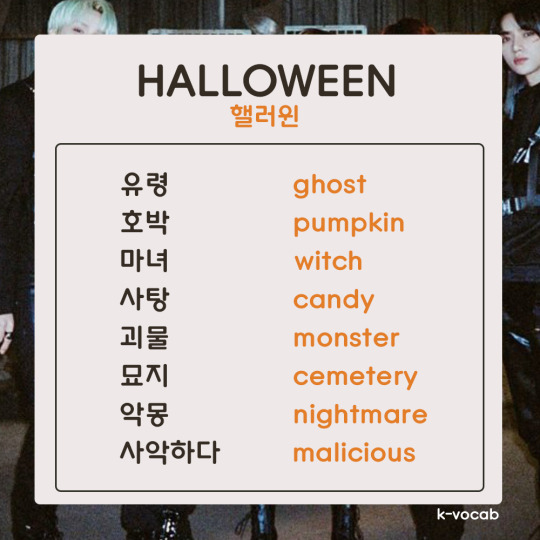
Happy Halloween! How about a spooky study session? 👻
#happy halloween#halloween#korean#studying Korean#korean language#learn korean#korean words#study#studyAbroad#studying#language study#language learning#languages#langblr#studyblr#koreanblr#vocab#korean vocabulary#korean vocab#study vocabulary#vocabulary
171 notes
·
View notes
Photo

If you read the whole lyrics of Rock with you by SEVENTEEN I’m sure you’ll be able to understand almost all of it! ♥
#seventeen rock with you#seventeen#koreanblr#studyblr#langblr#study#study korean vocabulary#studying Korean#language study#studying#korean#learn korean#korean words#korean language#lang#languages#language learning#korean langblr#vocab#vocabulary#korean vocabulary#korean vocab#study vocabulary
66 notes
·
View notes
Photo
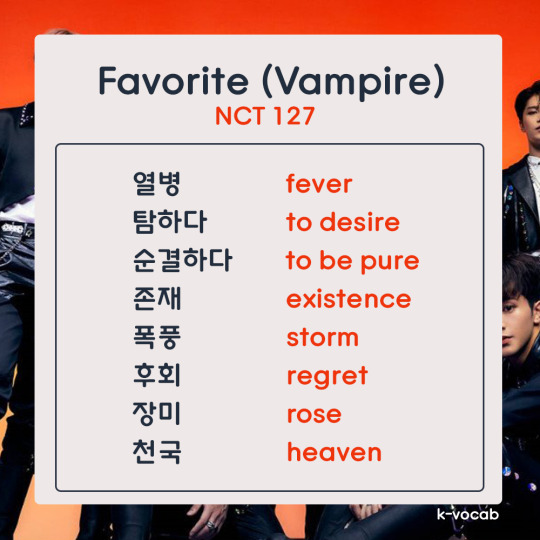
The vocabulary in Favorite (Vampire) by NCT 127 is so interesting! There are so many new words to learn ♥
#nct 127#nct 127 favorite#language learning#learn korean#learn korean with kpop#Learn vocabulary#vocab#vocabulary#korean vocabulary#korean vocab#study vocabulary#study#studying#studying Korean#language study#korean words#korean language#korean#studyblr#langblr#koreanblr
69 notes
·
View notes
Photo

The chorus of Sticker by NCT 127 lives rent free in my head. The lyrics are quite complicated, you should take a look at the whole translation! Happy studying ♥
#nct 127#nct 127 sticker#korean#learn korean#study#studying#studying Korean#lang#langblr#languages#vocabulary#language learning#korean language#korean vocab#vocab#Learn vocabulary#korean vocabulary#studyblr#koreanblr#korean words
51 notes
·
View notes
Photo
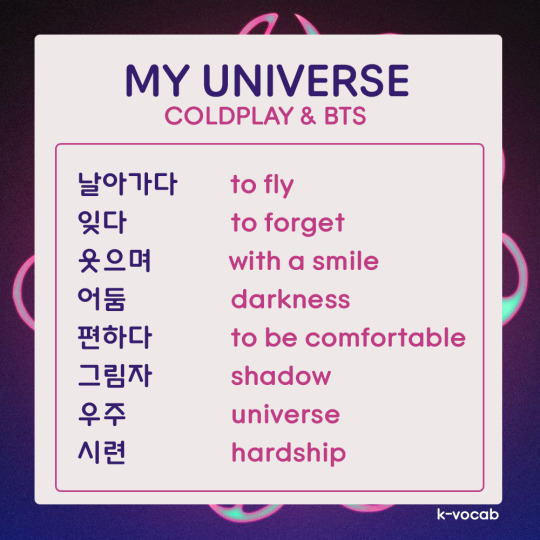
To my beautiful 1K followers, you’re my universe! Thank you so much for loving this blog ♥
#my universe#study#koreanblr#studyblr#langblr#korean langblr#korean#learn korean#studying Korean#korean language#korean words#vocab#vocabulary#korean vocabulary#korean vocab#Learn vocabulary#language learning#learn korean with kpop#languages#language study
45 notes
·
View notes
Photo

부모님 - parents
어제 - yesterday
죄송하다 - sorry
역사 - history
이번 - this (ex. this year)
계획하다 - plan
고양이 - cat
노력하다 - make effort
콧물이 나다 - have a runny nose
따뜻하다 - Warm
김치 - Kimchi
내용 - content
쓰다(모자) - wear (hat)
박물관 - museum
친절하다 - kind
Find the Quizlet here
110 notes
·
View notes
Photo
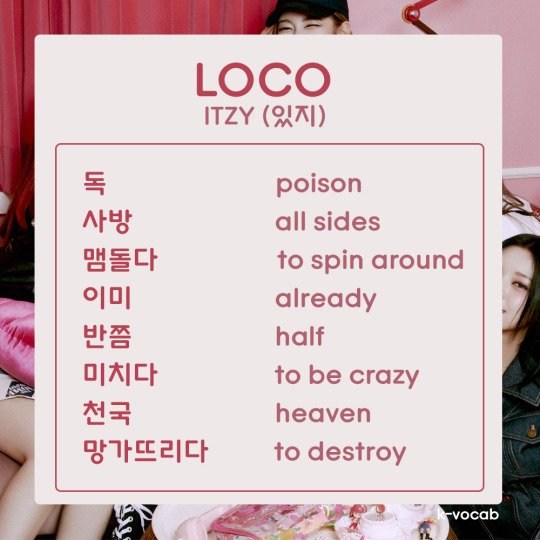
Loco-loco-co (╯3╰) The whole album is amazing! ITZY really delivered. The lyrics are so fun and easy to remember, have a nice study session!
#korean#learn#languages#language learning#language study#learn korean#studying Korean#korean language#korean words#vocab#vocabulary#korean vocabulary#korean vocab#Learn vocabulary#study#studying#koreanblr#langblr#studyblr#itzy loco
25 notes
·
View notes
Photo

You need some L.A.L.I.S.A! ���LALISA’ by LISA, what a catchy song, right?
#lisa lalisa#learn#language learning#korean#koreanblr#studyblr#langblr#language study#korean language#languages#vocab#vocabulary#korean vocabulary#Learn vocabulary#korean vocab#study#studying korean#korean langblr#learn korean vocab#learn korean with kpop#blackpink
23 notes
·
View notes
Photo

‘Stereotype’ by STAYC! So many new verbs, love the lyrics ♥
#stayc stereotype#learn korean#korean#language learning#learn korean with kpop#Learn vocabulary#vocab#vocabulary#korean vocabulary#korean vocab#study#studying#study korean#koreanblr#studyblr#langblr#languages#language study#korean language
85 notes
·
View notes
Photo

Nothing is more annoying than feeling like you know a lot, but then a conversations happens and you end up having no idea how to actually speak. This is mostly because you learn grammar points, and random vocabulary. Now it’s time to connect the two! How? Simple! Below are three English conversations, now it’s your turn to translate them. You can switch it up with other subjects, verbs, anything! 즐겁게 공부하세요!
#26 A Nice Flat (2)
Agent: Well, here’s the kitchen.
Jane: Hmm…It’s very small.
Agent: Yes, it isn’t very large, but there’s a cooker and a fridge. There are some
cupboards under the sink.
Jane: Are there any plates?
Agent: Yes, there are.
Jane: Good. Are there any chairs in here?
Agent: No, there aren’t, but there are some in the living room.
Jane: Hmm. There aren’t any glasses!
Agent: Yes, there are! They’re in the cupboard.
Jane: …and …er… where’s the toilet?
#27 Afraid of Flying
Bert: Where is your meeting?
Linda: In Dallas, Texas.
Bert: How are you going?
Linda: By plane.
Bert: Do you like to fly?
Linda: Sure. It’s fast and comfortable.
Bert: I’m afraid of flying.
Linda: That’s silly. Flying is very safe.
Bert: Maybe, but I don’t feel safe in a plane.
Linda: I understand. A lot of people feel that way.
#28 A Plane Reservation
Henry: I’d like to reconfirm my plane reservation.
Miss Lester: What flight are you taking?
Henry: Flight 207.
Miss Lester: And your name, please?
Henry: Henry Chandler.
Miss Lester: Yes, sir. You’re booked on Flight 207. Please check in at the airport an hour
before flight time.
Henry: Thank you.
63 notes
·
View notes
Photo
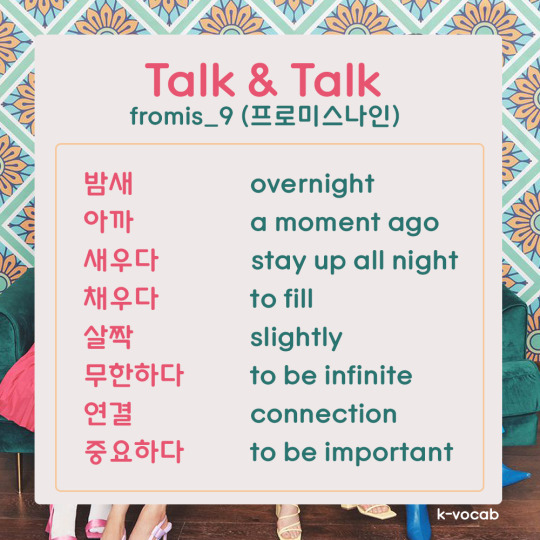
I can’t stop listening to ‘Talk & Talk’ by fromis_9! And the lyrics are so cute ♥ Did you know any of these words? Let’s learn some vocabulary words!
#fromis 9#talk & talk#koreanblr#studyblr#langblr#study#study korean#vocab#vocabulary#korean vocabulary#korean vocab#Learn vocabulary#learn#language learning#learn korean with kpop#learn korean vocab#learn korean vocabulary#learn korean#korean studyblr
52 notes
·
View notes
Photo
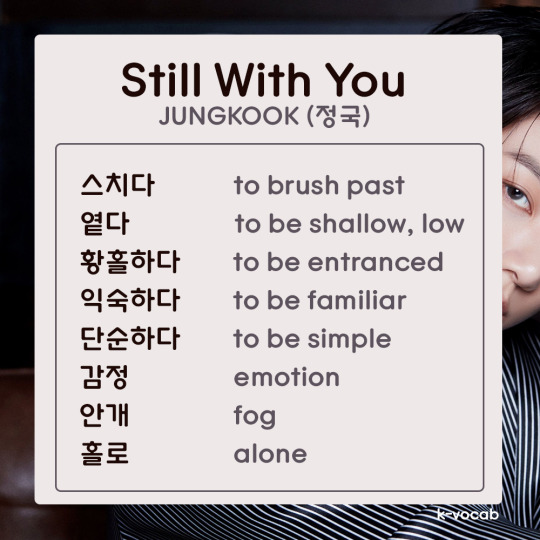
‘Still With You’ by Jungkook requested by @xxraexx9 ♥ 함께 웃고 함께 울고...
#koreanblr#studyblr#langblr#korean#learn korean#korean language#korean words#Korean Study#study#study korean vocabulary#study korean#vocab#korean vocabulary#korean vocab#vocabulary#Learn vocabulary#language study#language learning#languages#jungkook#still with you#learn korean vocab#learn korean with kpop
36 notes
·
View notes
Photo
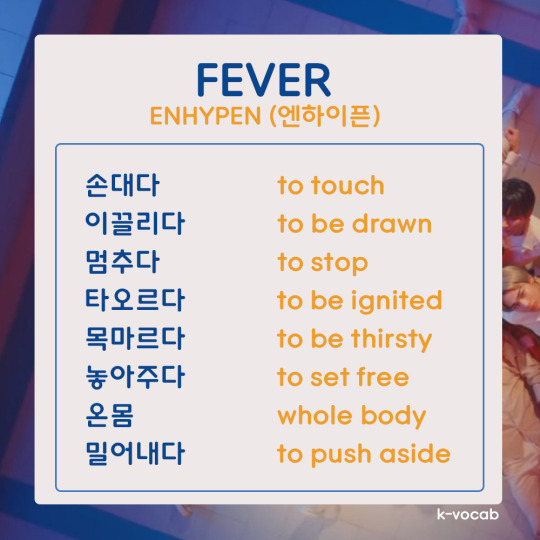
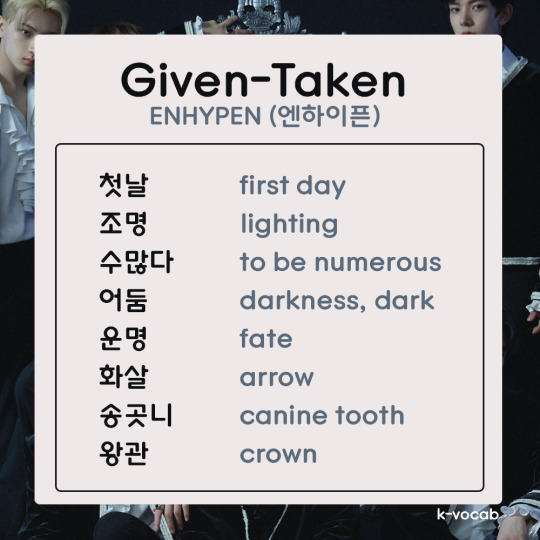
ENHYPEN songs requested by @welcometolalaland! ‘Fever’ is always stuck in my head!
#learn korean#language learning#learn korean with kpop#learn korean vocab#Learn vocabulary#vocabulary#vocab#korean vocab#korean vocabulary#languages#language study#korean language#langblr#studyblr#study#studying#Korean Study#enhypen#koreanblr
49 notes
·
View notes
Note
Hello ^^ I'd love to ask about the subject/topic particles. So for a sentence like 'I'll go to your house', should it be written as '나는 너의 집에 갈 거야" or '내가 너의 짚에 갈 거야'? And so I read on some sites that 내가 means 'I am', so can it be used for sentences which have the same structure (I am...) like in English? Thank you so much for answering ~
Hi! I watched this really great in-depth video about particles by Miss Vicky since I too often get confused with particles. In short, both sentences are correct, but you would have to choose which to use depending on the context. I recommend watching the whole video to learn about this, but I’ll try to condense it a little bit!
나는 너의 집에 갈 거야 can be just stating a general fact that you are going to your friends house. If someone asks you, 지금 뭐해요? (what are you doing right now?) you can reply with 나는 너의 집에 갈 거야. You’re just stating what you’re doing.
The particle -ㄴ/은/는 can also be used to suggest a contrast between what “I” is doing and someone else. You could say 민지가 학교에 갈 거야. 나는 너의 집에 갈 거야, carrying the meaning of “Minji is going to go to school, but I am going to go to your house.” Minji is going one place, while I, on the other hand, am going to your house.
내가 너의 짚에 갈 거야 is a little different. 내가 너의 짚에 갈 거야 is useful if you’re trying to emphasize that it is I that is going to your house. If someone asked, 누가 친구의 집에 갈 거야? meaning “who is going to your friend’s house?” you could say 내가 친구의 짚에 갈 거야, suggesting “it’s me who is going to my friend’s house.” (I changed “your” to “your friends” just to make it a little easier to understand.) That’s the basic difference essentially. Again, I think Miss Vicky’s video is really helpful and more detailed, so I highly recommend checking it out! But I hope that my explanation cleared up some of your confusion!
As for 내가 meaning “I am,” I wouldn’t necessarily say that. Of course it can be used in sentences that translate to “I am...” but I wouldn’t say that 내가 itself means that. 내가 is just “I” with a subject particle attached. I hope all of that makes sense! This is a great question so thanks for asking! 화이팅!
67 notes
·
View notes
Photo

*소리꾼: great singer, pansori singer.
This song is full of words we haven’t learned yet, right? ⛈️
#stray kids#stray kids thunderous#language learning#learn korean with kpop#learn korean#Learn vocabulary#vocab#vocabulary#korean vocabulary#korean vocab#studying#studyblr#study#language study#korean#korean language#korean words#Korean Study#koreanblr#languages#langblr
125 notes
·
View notes
Photo

Time to learn the name of delicious fruits! I love cherries (버찌), what about you? ♥
#korean#learn korean#korean words#korean language#Korean Study#studying#language study#study#frutis#vocab#korean vocabulary#vocabulary#Learn vocabulary#korean vocab#language learning#languages#langblr#studyblr#koreanblr
46 notes
·
View notes